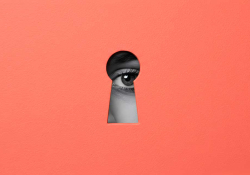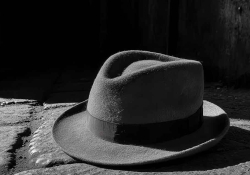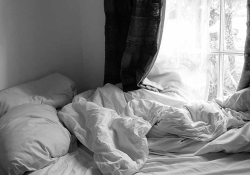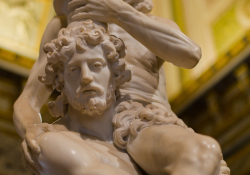The Public Scribe
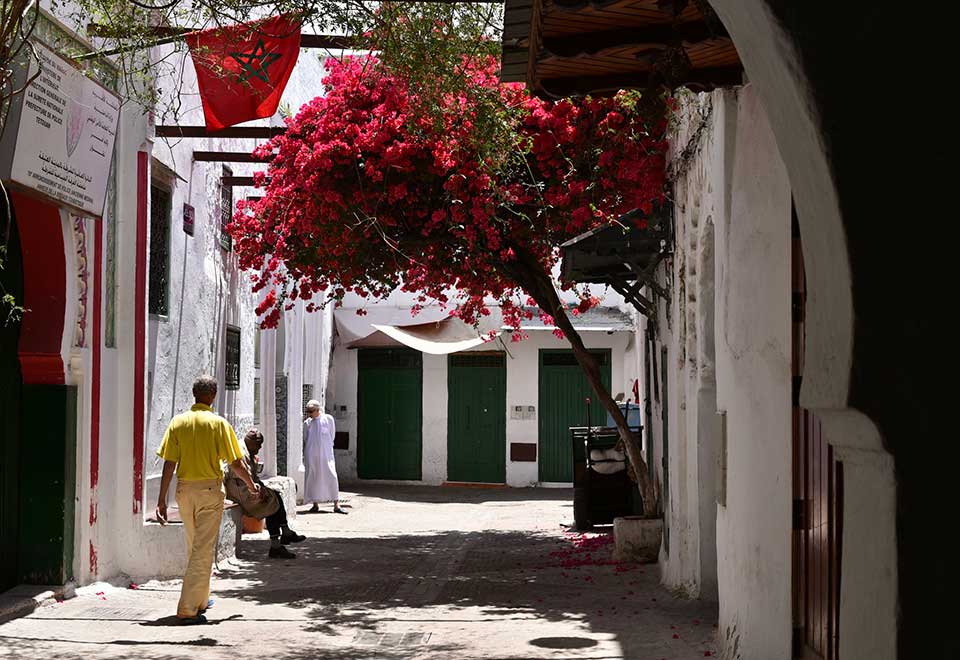
An early novel, L’Écrivain public (The public scribe) is a surrealistic, semi-autobiographical work that imagines the arc of the author’s life from infancy and youth to old age. The poetic and enigmatic eighth chapter chronicles his years as an isolated, bored young teacher in Tétouan, Morocco.
Everything is sealed: doors and hearts. This white city, Tétouan, is caught between two mountains. An asthmatic city, a citadel of appearance, a haughty body, burrowing herself beyond the reach of eyes and hands. Trying to enter her is audacious, an illusion. Even the wind, when it arrives, just goes around in circles. Doors and faces begin to close, without hurrying, without violence. During siesta time, the time for love, the wind topples the empty chairs at the cafés; it stumbles against the walls, against the silence. The wind howls, it whirls around and then goes away: the city tires it.
All around are squares, cafés on terraces or on balconies. One is before mirrors that reflect the truth, hard and precise. The morose eye and the hand give clues to what is going on. Empty bodies filled with shame feel separated, mutilated, strangers to themselves, nervous yet motionless, devoid of beauty, tired of going on, longing for a silent eternity, and illusory about the reassurance and acceptance by the gray mountains silhouetted against the blue sky. The muffled voices that follow the bees swarming around sugary mint tea confuse themselves in a mechanism of reflection and collide with the golden walls of a house built on ruins, its doors and windows locked, and which fades into the faraway horizon of the ocean or the desert.
A presence full of ostentation: so many empty vessels, deserted, solitary, and deathly.
The hand that has escaped darkness places itself on another hand that is covered in a fine layer of sand and a slight amount of sea salt, gets irritated and withdraws. But the other holds onto it, raises it to its wet lips, kisses, licks, wipes it, and lets the hand unfold like one face opening to another.
It’s siesta time, time for love, time extremely well planned, prepared, and time that chose to disappear, in one of the empty squares where city life has vanished, where a blind man bends to pick up a large fig leaf, shedding painful tears in the darkness that surrounds him, that nourishes him, and pushes him toward the sun. Ravaged by the power of darkness, he moves forward without groping, dragging his hand along the wall, and stops short before the face of a sleeping lover whose head rests on the wobbly table of an abandoned outdoor café.
It’s the hour of silence and vengeance when love is an adolescent, a street loafer, a shameless body bent over death, surrounded by a mass of thick smoke.
It’s the hour of silence and vengeance when love is an adolescent, a street loafer, a shameless body bent over death, surrounded by a mass of thick smoke, hot and smelly, a dazed face washed by worry, given over to the trembling hand that pulls it toward the trap where it will remain, far from the flies and ants, where it will slowly rot in a sublime metamorphosis until its unexpected and simple birth, a body gained cruelly by the grace of this city that disappears and effaces itself as one walks through it or writes it.
The city lowers her heavy eyelids and detaches herself from the arms of the ivy that has been tightly entangling her for a century. An old Spanish army officer unwittingly brought the ivy here. The city closes her eyes on the thick blanket of smoke and vapor, turning away and slowly separating herself from her legends. The legends fall, one by one. Tétouan empties the night of her shadows and gathers her past glory before dawn. She keeps quiet and slowly descends toward the sea. A white house made of stele with blue shutters stands at the edge of the sand. Cursed lovers once lived here. This house is now their cemetery. Here they hid themselves to love and to die.
It is the time when images fade and words fall and slip between stones. The city changes her face, her light and color. The city comes to an end in the narrative of a traveler, who finds himself alone, an orphan without memory, without language, totally crushed, and alone with anguish. It calls out to the city, in defiance or despair, and it waits. As if by miracle, the city fills up with her madmen and beggars, her women and her sun; she comes alive, opens the market and cafés, pulls up the store shutters, installs old peasant women in the small square at the medina’s entrance; they sell embroidered tablecloths and scarves, cotton blankets, and linen handkerchiefs.
Tétouan doesn’t sulk anymore during the night but sends back the words to the withered face of the storyteller, who sits in a corner of the main square and eats stale bread soaked in water. He speaks no longer. He watches.
Tétouan returns to her stones and settles for a while in her dwellings, in her mosques, on her rooftops. She doesn’t sulk anymore during the night but sends back the words to the withered face of the storyteller, who sits in a corner of the main square and eats stale bread soaked in water. He speaks no longer. He watches.
I knew boredom, emptiness, and darkness in Tétouan. I knew anguish during the never-ending nights crowded by shadows brought in by the crazy wind. Brutal nights filled with humid vapor came down upon me, which settled in my tiny bedroom on the rooftop of an old building. That’s where I lived; I spent my nights pushing away thick layers of nightly fabric that enveloped me and kept me awake, making it hard to breathe. Mornings brought me relief but felt very tired, exhausted from my nightly struggles. I climbed through the window onto the rooftop to breathe deeply. From there I could see the peak of Mount Darsa. Black, proud, and unapproachable. I was certain the night came from there.
Appointed to teach philosophy at a small lycée in the city, I decided to dedicate myself entirely to my students. This became my passion. Most of my students came from the Rif; they were sons and daughters of poor peasants. Their motivation to learn, their desire to understand and have discussions, made me feel less isolated, and my nights didn’t seem as long or devastated with shadows. I was filled with their attentive presence: they taught me about the countryside, blending the lessons with their lives. The only kind of philosophy for them was the one that would help them understand their immediate reality, their day-to-day life. They were passionate about Socrates, Marx, and Freud. Socrates seduced them with the honesty that illuminates his dialogues; Marx, through The Communist Manifesto, interested them because his words speak about conditions and situations they were familiar with; Freud opened for them windows to a universe of sexuality, which they never dared talk about. During discussions about Five Concepts of Psychoanalysis, the girls blushed and the boys suppressed nervous laughter. One day, a student decided to break the taboos; she gave a presentation to several classes of the lycée on the condition of young Moroccan girls of traditional background. It was a small scandal. Some parents saw in me a subversive element that planted doubts and encouraged contestation, sparking debates and questioning in a closed, tranquil, peaceful city, known for her respect for religion, sound and traditional values, a city where nothing should change, an immutable city with a screen in front of depravity taking place in secret. I became friends with a colleague from the lycée who knew the city well but was a generous outsider. He hated Tétouan. He cursed her. She felt the same way about him. I joined him on his drinking rounds. He dreamed of leaving this city and never coming back. Go away to China or the Antilles. Go far away and forget this city for good.
She stood with her feet covered by the white fabric, as though she emerged from an unfinished sculpture. This single image—a statue of love—inflamed my desire.
My love life during all this time was alarmingly wretched. From time to time, I made love to a pretty girl who called herself an independent student and was preparing for an entrance exam for a school in Spain. I believed her, and to be honest, I didn’t want to know much about her. She came to see me in the afternoons, always cheerful and funny. She loved disguising herself and surprising me during siesta time. One day she arrived wearing a huge white haїk and a veil, her eyes excessively made up. She asked me to help her take off the haїk. As I pulled one end, she spun around like a mechanical doll and stood completely naked. She stood with her feet covered by the white fabric, as though she emerged from an unfinished sculpture. This single image—a statue of love—inflamed my desire. Blushing like an adolescent, I ejaculated in my pants. She could tell what had happened, and spreading the haїk on the floor, she stretched on her belly and played with her feet in the air. Her hands tore off my clothes and caressed me for a long time. Then she got up suddenly, put on her haїk quickly, and rushed off to get home before her father’s return. I remained stretched on the floor, naked, wondering, only half-believing what she said. I found out later that she was a prostitute who sold herself to rich men.
I had had a strange relationship with a young teacher in Tangier. It was an enigmatic experience: during the time we saw each other, she never said a single word. I spoke for both of us. I asked questions and gave answers. She nodded her head and offered me her full, trembling lips. She wasn’t dumb but refused to speak. In any case, she didn’t speak to me. She tried to explain in a letter the reasons behind her silence. I remember this letter, written with a pencil or, rather, murmured, a phrase that could be read on her lips, not heard but imagined and which could be wiped off, erased as though it had never been said:
What difference does it make to you that my life is one of silent words? What image will you have of me because of the way I think about you? Until the end of my being, silence. . . . Across my chest, a shepherd runs behind his herd of sheep, raising dust and suffocating me, but the joy comes from a horse that you cannot see; my face is deeply worked over by my love for you that you cannot even imagine. I am cold, surrounded by tall flames that I grasp with my hands, and I wait, happily, hoping that grace will descend on me from your eyes and lead me to death. . . . Whether or not you believe me, this is how I love you; my voice is already buried in the depth of my soul, a little deeper than this body that you enter . . .
My second year in Tétouan was miserable. I lost my enthusiasm and became lazy. The city filled my nights. She obsessed me. I saw her as a house with high walls, grottoes and caves, a house where they forgot to have openings—doors and windows. Yet something held me there, perhaps the nightly anguish and the struggle. There were times when I woke up in the middle of the night and tried to push away the presence of an intruder, a thick mass that approached me to settle on my body, envelop and suffocate me. An immaterial mass surged toward me with the same force as lead melted in black castings that coats the body and seals the lungs.
Festivities were rare. How could I have some fun and escape this heaviness? One day I was invited to a wedding. Perhaps not a party but a curiosity, a break from my monotonous life.
The groom was a modest and unassuming man. A colleague from the lycée. I can’t remember his name or his face. It’s not a question about good or bad memory. There are faces that leave no impression, doomed to anonymity. They are neither beautiful nor ugly but have no presence. I remember his frail figure wearing a gray gabardine and carrying an old black case that didn’t close well. The man was discreet and thrifty. He was neat, organized. He had his habits. How could anyone escape from them? Tétouan gives habits. They are essential for one to have them in order to live and sleep peacefully in this city. Of course, one may choose between habits and anxiety. My colleague, like many others, decided to give in to order and satisfy his modest needs. Every day at the same time—between five and six thirty in the evening—he sat at the Café Nacional and ordered a big cup of café au lait and two tartines. He drank and ate alone, smoked two cigarettes that he discreetly took out of his pocket (it was out of question to place the packet on the table), read magazines that he never bought but rented from the strolling vendors, repeatedly exchanged the same meaningless sentences with the same people, and then he returned home. Did he live alone, with his parents, or in a Spanish boarding house? Nobody knew.
One day, I found a wedding invitation card from him in my mailbox. He had invited all his colleagues, including an old homosexual and an amateur poet. He was the father of five children to whom he hardly spoke.
I was intrigued and curious. How was this man (groom) of exemplary discretion and silence, master and slave to his habits, going to suddenly disrupt his perfectly mechanical harmony and open his house and life to a stranger? Later I found out that the bride was a cousin, that they had been engaged for five years, and that she lived with her mother.
Before going to the wedding, I asked my friend what I could get as a gift. He told me not to worry about it. All I needed to do was put some money in an envelope with my name on it. This was the tradition among people of modest means.
The groom’s brother welcomed us at the entrance of the house, which was decorated with colored bulbs arranged in the shape of a star. With one hand he greeted me, with the other he seized the envelope while saying polite phrases like “God will return it to you” or “May God bless you with prosperity and happiness.”
A local orchestra played “Soleil du crépuscule,” a classical piece from Andalusia, without much enthusiasm. We were offered tea and pastries. It was pitiful. We were utterly bored. Some yawned, others fought against sleep. I observed every detail to keep myself from sinking into boredom. My friend made comments like: “The wife of that man who just arrived is beautiful but a lesbian.” Of course, only men surrounded us. We decided the women were in the house next door. It was unpleasant for everyone. I wanted to leave, but my friend held me back by saying: “If you leave before dinner, it will seem as though you think yourself superior to these poor people. You have to stay till the end!” Dinner was served around midnight. The food was barely warm. I hate eating food that is served cold. Hands reached out and fingers plunged into the chicken in the same manner. For drinks, Coca-Cola and Fanta were served in big glasses.
Around one in the morning, it was time to fetch the bride from her house. The brother got busy organizing the procession of the cars. Mine—an old 1000 Simca—was chosen as one. I always detested this kind of situation. I found myself cramped in my car with strangers who were excited by the idea of going to fetch someone else’s wife. Fortunately, Tétouan is a small city; we got there fast. I felt as though I had been hired for this service and followed other cars without joy, without pleasure. I regretted having taken my car. The evening was wasted. It was past my sleeping hours. So I decided to join the others in the game of crying out the ritual phrases: “Here he comes. I swear he has brought her with him and didn’t leave her for us . . .” I was ridiculous. I cried along with the others. I was looking for a little joy but found only weariness. I was celebrating the marriage of an almost stranger. Irritated, I drove away from the wedding procession, dumped my passengers at an intersection, and went home to sleep. I couldn’t close my eyes all night. So I made myself some coffee and read Ulysses. It was the only way to forget the sinister evening and travel far away from it.
I decided to leave this city and forget her walls and customs.
Translation from the French
Editorial note: Chapter 8 from L’Écrivain public (Seuil, 1983), copyright © 1983 by Tahar Ben Jelloun. Translation copyright © 2019 by Rita S. Nezami.

